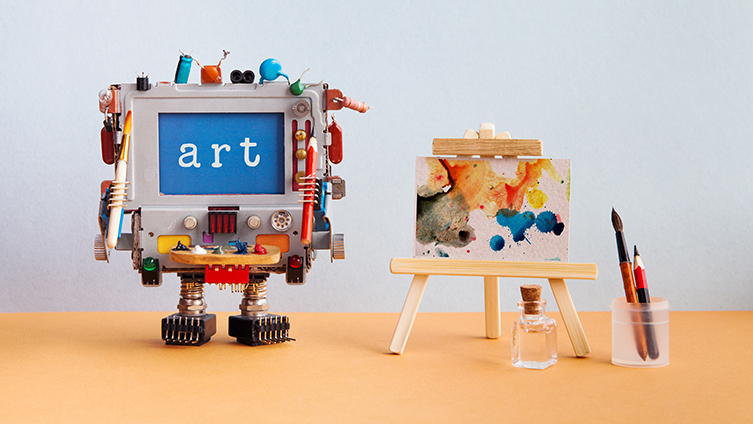Can AI be truly creative?

AI is everywhere. It makes decisions for us, influences us, and assists us. We know that it is powerful and accurate, but can it be creative?
When it comes to technology, artificial intelligence takes centre stage in the public consciousness. We have long been fascinated by the prospect of a future with increased automation and improved efficiency.
There is an allure surrounding it, a mysticism almost, but people still have their reservations.
Some worry that artificial intelligence will make us redundant. We often ask the question: “What place will I occupy in a future full of artificial intelligence?” It’s one that needs to be asked, as we move towards worker-less factories and self-driving vehicles.
We seem to be fast approaching the end of some professions but perhaps the proliferation of AI will generate new professions: that is if our education systems keep up with its advancements.
Artificial intelligence helps us to make decisions, some trivial and some important. It decides what movies we watch, the artists we listen to, the route we take home from work and the people we might fall in love with. AI also influences us; it knows exactly when to show an ad. AI might know us better than we know ourselves.
One thing is clear: AI has become a vital part of human life. It has laid down roots in the workplace and at home, but in the art world, however, it is still finding its feet.
How can AI be creative?
Obvious, a Paris-based art collective, explore the interface between art and artificial intelligence. They made headlines last year with their AI-generated artwork, a portrait named Edmond de Belamy.
Using a generative adversarial network (GAN), a deep learning algorithm, Obvious produced a unique painting by feeding it 15,000 portraits painted between the 14th and 20th centuries. After analysing the dataset and creating Edmond de Belamy, the algorithm then attempted to trick itself into believing it was authentic by comparing it to its dataset again.

The artwork looks familiar and traditional. One can see flickers of Rembrandt or a touch of Manet. Yet at the same time, it appears almost contemporary, even though it’s steeped in the summation of 600 years of art history. This particular piece gained notoriety for being the first artificial intelligence created artwork to sell at auction. It fetched $432,500, well over its pre-auction estimate of $10,000.
Another collaborative project, named The Next Rembrandt, also created an artwork through machine learning. The project aimed to “distil the artistic DNA of Rembrandt” by analysing his paintings pixel by pixel, using state of the art facial recognition. It then determined a project based on this dataset, before spending over 500 hours rendering the features of the subject, finally bringing it to life with a heightmap which mimics brushstrokes.
The result was a new portrait with all the hallmarks of a Rembrandt, four centuries after his death. Though as Marcus Du Sautoy writes, is it any more than a product of a machine working on human input?
“At the moment, all the creativity in machines is being initiated and driven by the human code. We are not seeing machines compelled to express themselves…They are ventriloquist dummies and mouthpieces serving our urge to express ourselves.”
Marcus Du Sautoy
Can artificial intelligence make music?
Perhaps one area of creativity where AI is excelling is in music. Computer-generated music is nothing new, it has been done for decades. In the 1960s, Raymond Scott invented the Electronium. It was the first of its kind, an electronic sequencer which used pre-programmed algorithms to sequence a unique melody each time. Now, using Google Magenta, Yuri Suzuki has recreated an Electronium for the modern age. It is currently being presented at the Barbican exhibition, AI: More than Human.
These creations pose questions about the fundamental core of creativity and our relationship with machines. Can it be called art? Sometimes we look beyond the finished piece, to the life experience of the hand that made it. If a machine doesn’t have this, how do we connect with its creation on a human level?
Does artificial intelligence have a place in art and creativity? Let us know what you think on Facebook.
